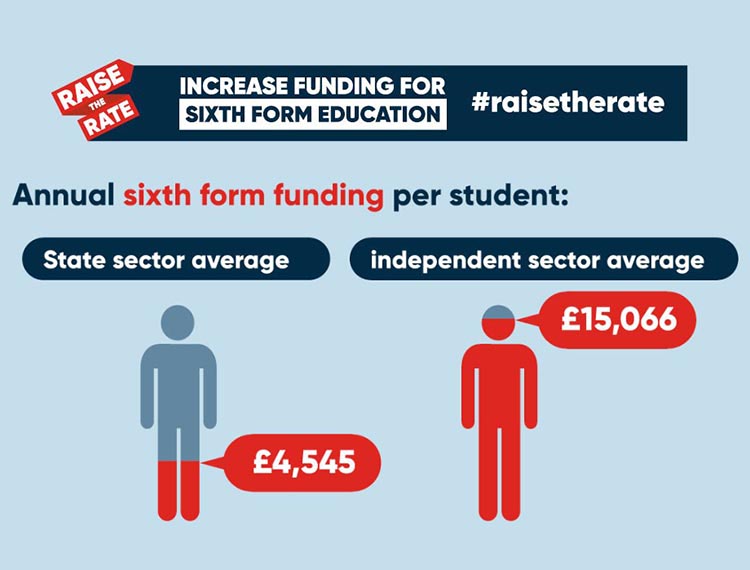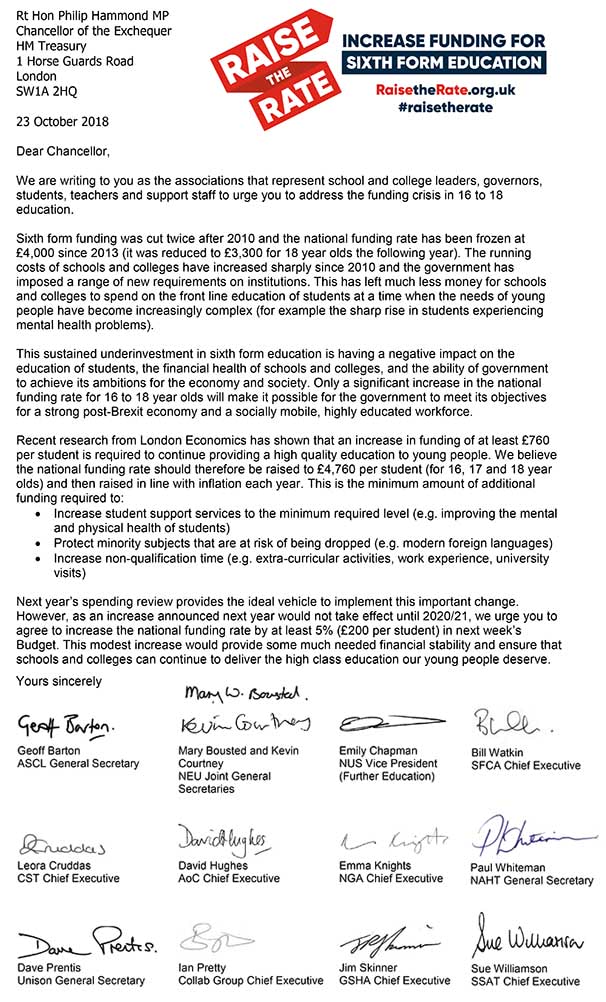Chancellor urged to #RaiseTheRate of funding for sixth form students

Twelve associations that represent school and college leaders, governors, students, teachers and support staff in England have written to Chancellor of the Exchequer Philip Hammond urging him to increase funding for sixth form education in next week’s Budget.
The letter was written to mark the launch of the associations’ Raise the Rate campaign, aimed at increasing the funding rate for sixth form students that has been frozen at £4,000 per student, per year since 2013.
In the letter, the associations claim that a combination of funding cuts and cost increases “has left much less money for schools and colleges to spend on the front line education of students at a time when the needs of young people have become increasingly complex (for example the sharp rise in students experiencing mental health problems).”
The associations use recent research from London Economics to press for a £760 per student increase to sixth form funding that is raised in line with inflation each year as “only a significant increase in the national funding rate for 16 to 18 year olds will make it possible for the government to meet its objectives for a strong post-Brexit economy and a socially mobile, highly educated workforce.”
The £760 increase is described as the “minimum required” to increase student support services to the required level, protect minority subjects such as languages that are at risk of being dropped, and increase extra-curricular activities, work experience opportunities and university visits.
However, as major funding decisions are not likely to be taken until next year’s spending review, and would not take effect until 2020/21, the associations urge the Chancellor to introduce a “modest increase” to the funding rate of at least £200 per student in next week’s Budget “to provide some much needed financial stability and ensure that schools and colleges can continue to deliver the high class education our young people deserve.”
Commenting on the letter:
Geoff Barton, General Secretary of the Association of School and College Leaders said:
“It makes no sense whatsoever that the basic funding rate in sixth forms and colleges is a miserly £4,000 per student, while universities are charging tuition fees of up to £9,250, often for fewer teaching hours. Government cuts to 16-18 education have severely damaged a sector which is pivotal to the life chances of young people, and an immediate funding uplift is essential.”
Mary Bousted and Kevin Courtney, Joint General Secretaries of the National Education Union said:
“Cuts to sixth form education have been particularly severe. Teachers in sixth form colleges and schools with sixth forms have seen the damage done by the cuts. The government must reverse the cuts to sixth form education.”
Emily Chapman, Vice President (Further Education) of the National Union of Students said:
“Successive budget cuts have left many colleges in a state of financial instability. The result has been course closures, cuts to student support, and reductions in teaching provision. For too long students have had to make decisions about their future and learning prospects based on affordability, this is wrong. The Chancellor must take note and implement the proposals that are long overdue.”
David Hughes, Chief Executive of the Association of Colleges said:
“The evidence continues to mount, showing that colleges have faced a decade of cut after cut, reform after reform. We are pleased to be part of this coalition of organisations saying ‘enough is enough’. What the sector needs is not initiatives for the sake of initiatives, but a fair and sustainable base rate of funding that allows colleges to concentrate on what they do best. Last week saw the biggest further education protests in a generation – with the sector, the public, and politicians from all parties united in their pursuit for a fair rate of funding that will allow colleges to not just survive but thrive.”
Emma Knights, Chief Executive of the National Governance Association said:
“Many sixth-forms and schools have tried all available options to use their funding more efficiently and their governors and trustees are now forced into a position where they must make difficult and damaging decisions. We urge the government to invest in the future of young people now by raising the rate for 16-18 providers, as part of an overall increase in school funding.”
Dave Prentis, General Secretary of Unison said:
“In sixth form colleges across the country support staff jobs are being cut, putting added pressure on the remaining employees. Sixth form education needs long-term investment so colleges can meet the needs of students.”
Ian Pretty, Chief Executive of the Collab Group said:
“We support the Raise the Rate campaign to increase 16-18 year old funding to £4,760 per-pupil. It is crucial that colleges are provided with sustainable funding to continue to provide transformative support to learners, employers and local communities.”
Jim Skinner, Chief Executive of the Grammar School Heads Association said:
“Our post 16 students are being badly let down. The grossly inadequate funding means that what our schools and colleges can provide for them, is really only part-time education in oversized classes. Further courses without large numbers simply cannot be delivered, denying many students the opportunity to study crucial subjects such as modern foreign languages.”
Bill Watkin, Chief Executive of the Sixth Form Colleges Association said:
“Sixth form education is not just about exam results, it includes a host of essential wrap-around experiences. If we don’t fund it properly, something must give and young people won’t get the high-quality education they deserve. Every year, colleges are being asked to do more with less, and we must not sit idly by while young people are short-changed.”
Paul Whiteman, General Secretary of schools leaders’ union NAHT said:
“Sixth forms and colleges have been particularly hard hit by cuts to education funding. That directly impacts the quality of education and opportunities for young people at a crucial moment in their lives, as they launch into the world of work or higher education, and make important decisions about their futures. The issue of school and college funding isn’t going away – only new money from the Treasury will solve the funding crisis.”
Sue Williamson, Chief Executive of SSAT, the Schools, Students and Teachers network, said:
“The state of post-16 funding is a national disgrace. Schools are having to subsidise their sixth form provision from other areas of their budget; although of course sixth form and FE colleges are unable to do this. If we are serious about Britain’s economy post-Brexit we have to raise the rate for our sixth form students as a matter of urgency.”

The twelve associations supporting the campaign are:
Association of Colleges, Association of School and College Leaders, Collab Group, Confederation of School Trusts, Grammar School Heads Association, National Association of Head Teachers, National Education Union, National Governance Association, National Union of Students, Sixth Form Colleges Association, SSAT: the Schools, Students and Teachers network, and Unison.

Responses